Dezeen School Shows: a sustainable crematorium that crystallises ashes using water cremation is included in Dezeen’s latest school show by students at Arts University Bournemouth.
Housing that aims to introduce single-living residents into a community to reduce loneliness and a project that aims to create sustainable change in the tourism industry.
University: Arts University Bournemouth
School: Design and Architecture
Course: BA (Hons) Interior Architecture and Design
Tutors: Monica Franchin, Michael Cavagin, Ed Ward, Emily Manns, Jamie Yeates, Madalina Voicu and Charlotte Lacey-Clarke
School statement:
“Our course is positioned with the clear aim of developing interior architecture and design graduates who see themselves as creatively confident, technically competent, critically capable and ready to commence within the professional interior architecture and design community of practice, or related fields.
“The BA (Hons) Interior Architecture and Design at the Arts University Bournemouth has an enviable record in graduate employment, often working with clients on real design projects in a studio-based, professionally-focused learning environment.
“Our students have demonstrated the ability to influence changes in our society, their work is set in a global context but with a human-centred approach.
“They have communicated their desire to develop a better world for all in a sustainable manner.
“The work that our students have produced supports our aim to empower each of them in progressing to their chosen destinations, further developing and realising their potential as professional designers.
“You will see that the students have embraced the powerful role of designers to enable people to live well and wisely alongside each other, with a realistic use of resources.
“During the three years with us, our students have developed the capacity to collaborate and embrace empathy to our society’s immediate and long-term needs.”
The Future of Modularity by Dan Downer
“The aim of this project is to reconsider conventional design when applied to compact living spaces.
“These spaces will be suited to individuals and couples working within professional fields, providing shorter commutes and high quality, compact living spaces.”
Student: Dan Downer
Course: BA (Hons) Interior Architecture and Design
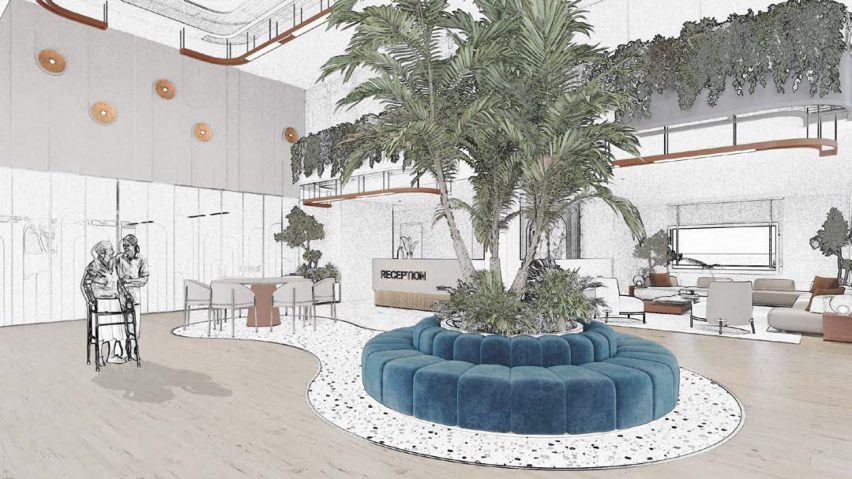
The Secret Garden by Tala Alkhiami
“The Secret Garden is a redefined, comprehensive palliative care centre that will deliver a high quality health care service, with a focus on patients’ and families’ psychological and mental wellbeing.
“The planned facility is designed to accommodate patients in a well-considered environment as well as support the NHS and healthcare systems in the UK.”
Student: Tala Alkhiami
Course: BA (Hons) Interior Architecture and Design
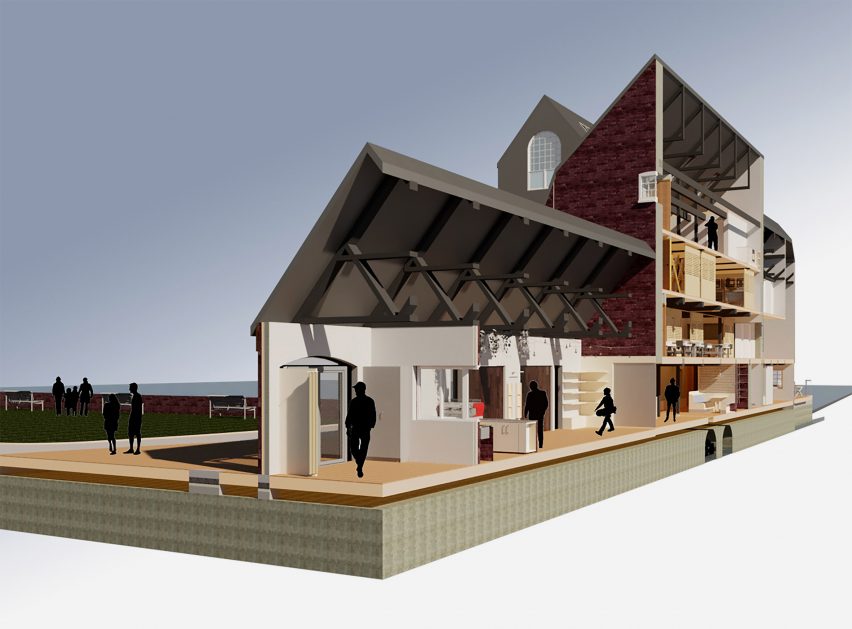
The Mill House by Harry Powell
“Considering the future of design, there is now a heavy focus on sustainability.
“In addition to this, there is increasing importance in how communities can collectively combat climate change.
“Offering a space, vision and experience for all ages, the tidal mill – reimagined with a new water turbine – helps create a carbon zero building.”
Student: Harry Powell
Course: BA (Hons) Interior Architecture and Design
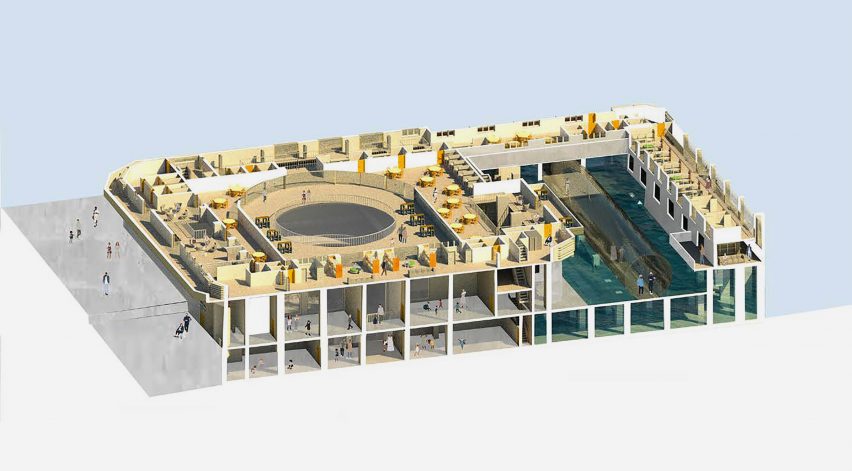
Mind the Gap by Molly Rook
“The intention of this project is to put emphasis on the importance of ‘third spaces’ in bridging gaps between socio-economic groups in city planning.
“The project creates a collection of communal spaces on the three lower levels of brutalist social housing block, Wyndham Court, Southampton.”
Student: Molly Rook
Course: BA (Hons) Interior Architecture and Design
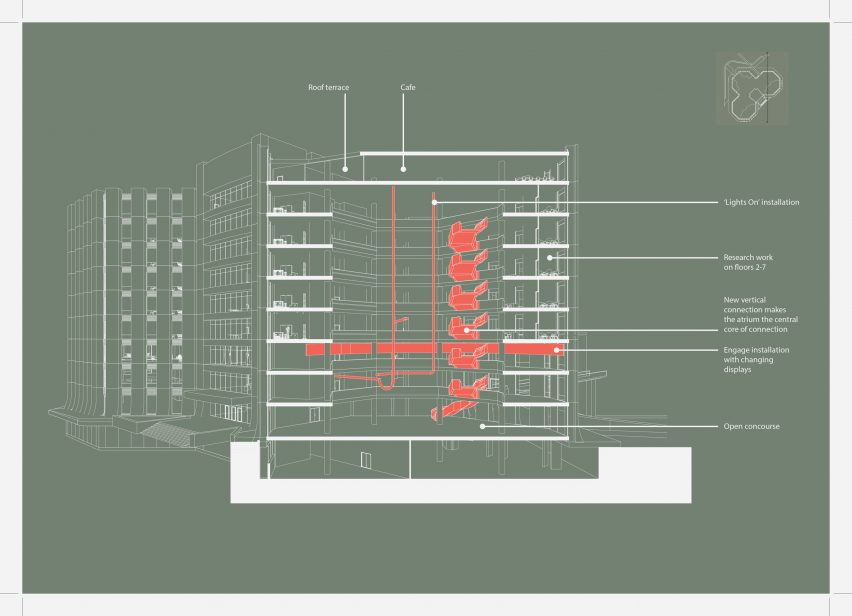
Collective Possibilities by Isabella Williams
“Reforming healthcare focuses on gathering, synthesis and exploration of data.
“It provides an environment, promoting human value to reduce healthcare inequalities.
“Entitled Collective Possibilities, the evolutionary nature of research answers to the ‘possibilities’, while ‘collective’ highlights the promotion of cross-disciplinary collaboration.”
Student: Isabella Williams
Course: BA (Hons) Interior Architecture and Design
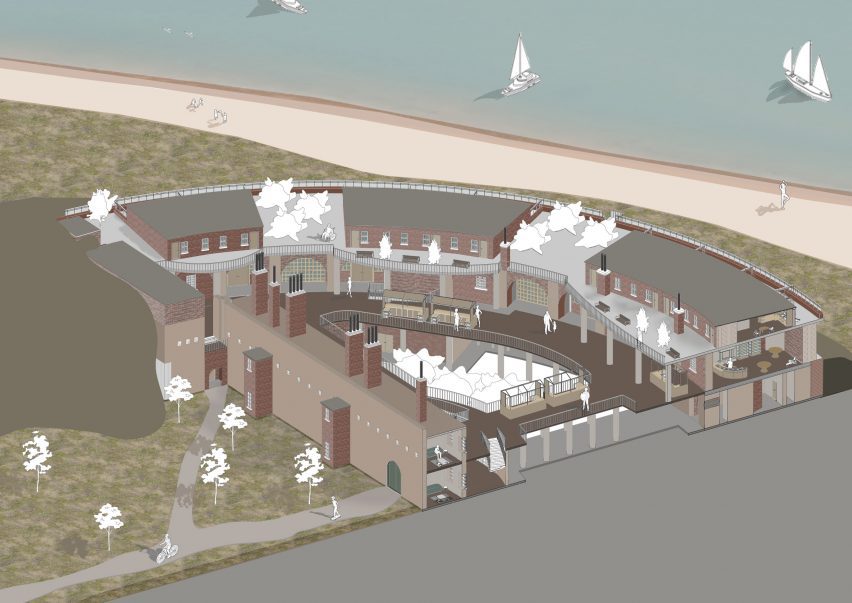
Fort Homestead by Femke Burley
“Contributing towards the ongoing battle to reverse the negative impacts of humans on the health of our planet, there is an opportunity for change in the tourism industry to redefine the current concepts of tourism in a post-pandemic society.
“This project aims to develop the concept of slow tourism through the enhancement of a heritage site in Gosport, England, known as Fort Gilkicker, in order to promote the general idea of being a ‘tourist in your own city’.
“It also encourages culturally-motivated travel to contribute to a more economically and environmentally sustainable future for society.”
Student: Femke Burley
Course: BA (Hons) Interior Architecture and Design
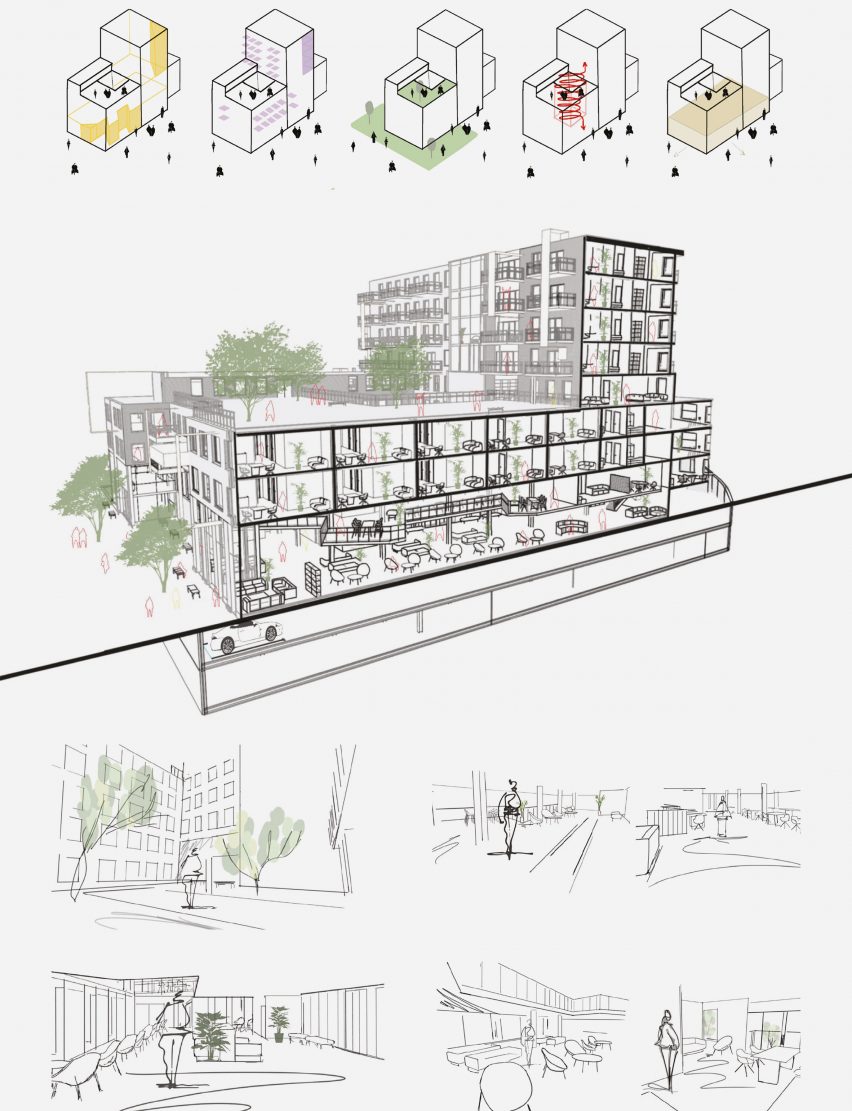
Phases by Lara Monasingh
“Current housing is unsuitable, inflexible and expensive. It creates issues in affordability, social separation and loneliness.
“This model aims to change the preconception of housing and inform future developments by providing an intergenerational living system.
“It creates the opportunity for individuals who struggle with the challenges of living alone to be a part of a bigger community where knowledge, skills and experiences are shared.”
Student: Lara Monasingh
Course: BA (Hons) Interior Architecture and Design
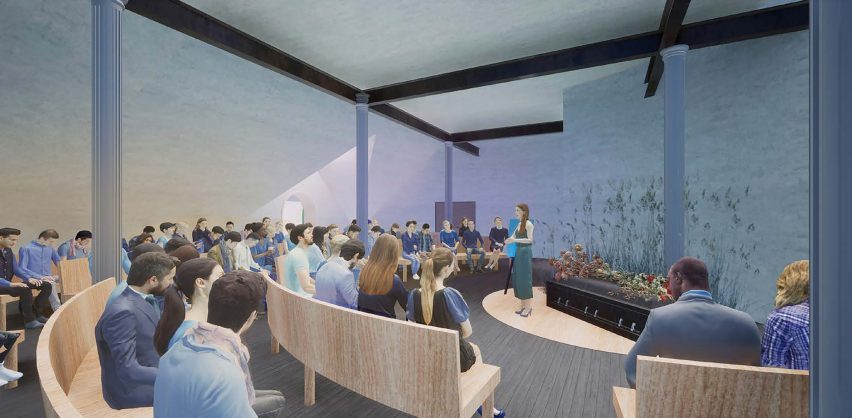
REVE: The Water Crematorium by Trinity Tam
“REVE converts the historic Chapel Mill building in Southampton into an alternative sustainable crematorium.
“Within the building walls of REVE, the deceased live on as sparkling crystals made from their ashes.
“This project uses water cremation and has spaces to support funerals, after-death arrangements and memorialisation.”
Student: Trinity Tam
Course: BA (Hons) Interior Architecture and Design
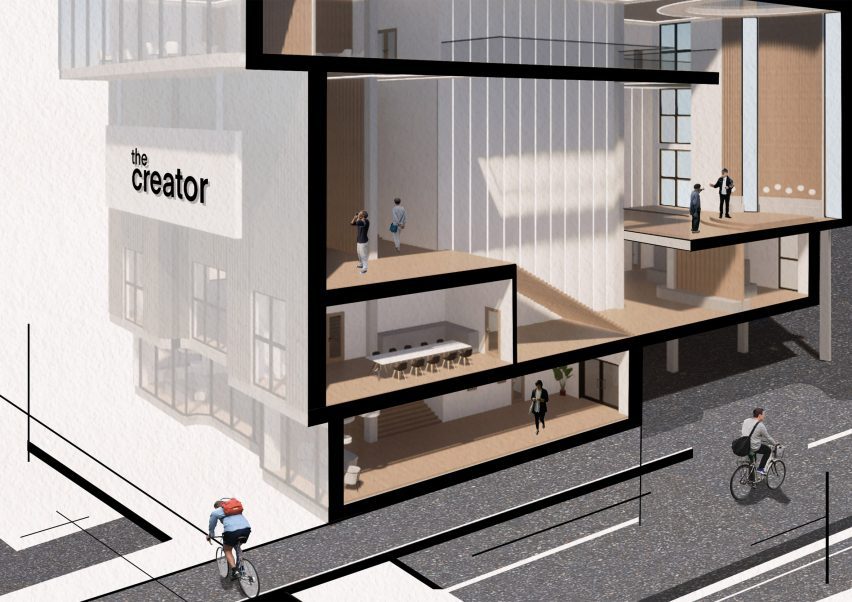
The Creator by Orla McKee
“The project aims to provide an immersive experience that rethinks the existing typology of exhibition spaces as more than a showcase of information, but rather an experiential journey that opens up the potential of the space for the act of creation – taking form in multiple artistic/musical avenues.
“As uncovered within my dissertation research, psychogeographic techniques enable the user to develop a personally-curated narrative.
“It provides each user with a level of personal influence within their journey path, both regarding navigation and creative opportunity.”
Student: Orla McKee
Course: BA (Hons) Interior Architecture and Design
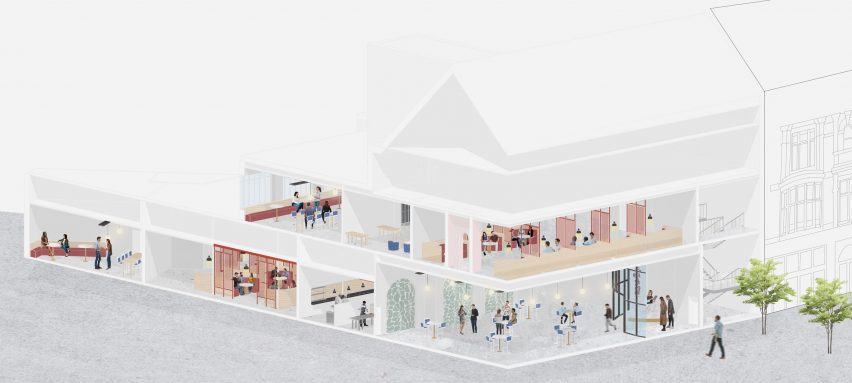
Navigate by Seralyne Lubila
“With advancements in technology, more people are eating at home rather than eating out. As a result they miss out on the experience of dining out.
“Navigate is a novel approach to dining experiences, aiming to bring individuals together in a social setting.
“As users navigate through the building, they will enjoy the different meal courses in dedicated spaces, each designed to emphasise the social bonds created.”
Student: Seralyne Lubila
Course: BA (Hons) Interior Architecture and Design
Partnership content
This school show is a partnership between Dezeen and Arts University Bournemouth. Find out more about Dezeen partnership content here.

